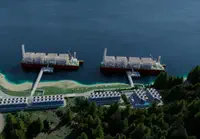Canada"s LNG Ambitions Are Growing
Canada is once again chasing its dreams of becoming a major player in the liquefied natural gas (LNG) market, aiming to attract an astonishing $109 billion in capital investment as reported by Natural Resources Canada. However, this ambition comes at a time when the world is increasingly aware of the devastating impacts of fossil fuels on our planet. The LNG Canada project in Kitimat has finally come online, but the accompanying projects raise serious questions regarding sustainability and social justice.
Indigenous Communities Face Unprecedented Pressure
Among the proposed developments is the Ksi Lisims LNG project, spearheaded by the Nisga"a Nation in partnership with Rockies LNG. President Eva Clayton claims the project will mean "prosperity" for her community. However, this narrative must be examined critically. Indigenous communities across Canada are often faced with the pressures of development that either overlook their voices or outright ignore their environmental concerns. The rush to monetize natural resources can lead to devastating consequences for the ecosystems they depend on.

Centre Block Construction Update (2024)
Environmental Risks Are Too High
While proponents argue that natural gas serves as a bridge to renewable energy, it remains a fossil fuel with significant environmental implications. Communities like Kispiox, a renowned fishing hub, are voicing concerns about the potential impact of the Prince Rupert Gas Transmission Line on local watersheds and salmon populations. Chief Councillor Kolin Sutherland-Wilson emphasizes the rarity of their clean waters, stating, "This is one of the rare parts of the world where you can drink from the streams, you could drink from the rivers." The ecological cost of LNG expansion could be catastrophic.
Policy Changes Favor Rapid Development
Recent legislative changes in Ottawa, British Columbia, and Ontario aim to expedite major infrastructure projects, despite significant opposition. The sentiment among the public appears to be shifting towards acceptance of new energy projects. However, this acceptance is troubling. It raises ethical questions about who benefits from these projects and at what cost to local communities and ecosystems. According to the International Institute for Sustainable Development, the risks associated with LNG expansion in Canada outweigh the potential economic benefits.

Botang Lng News
Global Competition Poses Additional Challenges
The U.S. continues to dominate the LNG export market, and Canada’s aspirations may falter against this backdrop. With emerging projects in Alaska backed by governmental support, analysts like Martin King from RBN Energy warn that Canada could be sidelined. The U.S. commitment to energy infrastructure further complicates Canada"s position in the global market. The stakes are incredibly high, and without a clear and responsible strategy, Canada risks losing its chance to enter a competitive space.
The Clock Is Ticking
Industry experts suggest that the next five to ten years are crucial for Canada to capitalize on LNG demand, particularly in Asian markets. However, this urgency must not blind policymakers to the broader implications of fossil fuel dependence. As Dulles Wang from Wood Mackenzie pointed out, the role of gas in the energy landscape is becoming increasingly uncertain, as renewables gain traction. The question remains: will Canada’s leadership take a stance that prioritizes environmental justice and the rights of Indigenous peoples over short-term economic gain?



![[Video] Mount Etna erupts in Sicily, lava reaches 400 meters, yellow alert issued](/_next/image?url=%2Fapi%2Fimage%2Fthumbnails%2Fthumbnail-1766917884234-2sqn18-thumbnail.jpg&w=3840&q=75)
![[Video] Hawaii's Kilauea volcano erupts, fountains reach 70 ft, USGS reports](/_next/image?url=%2Fapi%2Fimage%2Fthumbnails%2Fthumbnail-1766574042820-tucull-thumbnail.jpg&w=3840&q=75)


![[Video] Gunfire between Iraqi security forces and Sadr militias in Baghdad](/_next/image?url=%2Fapi%2Fimage%2Fthumbnails%2Fthumbnail-1768343508874-4redb-thumbnail.jpg&w=3840&q=75)
